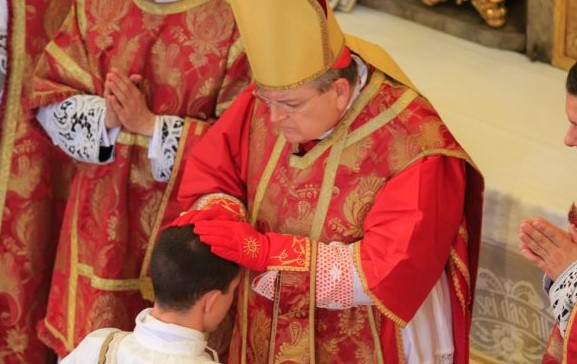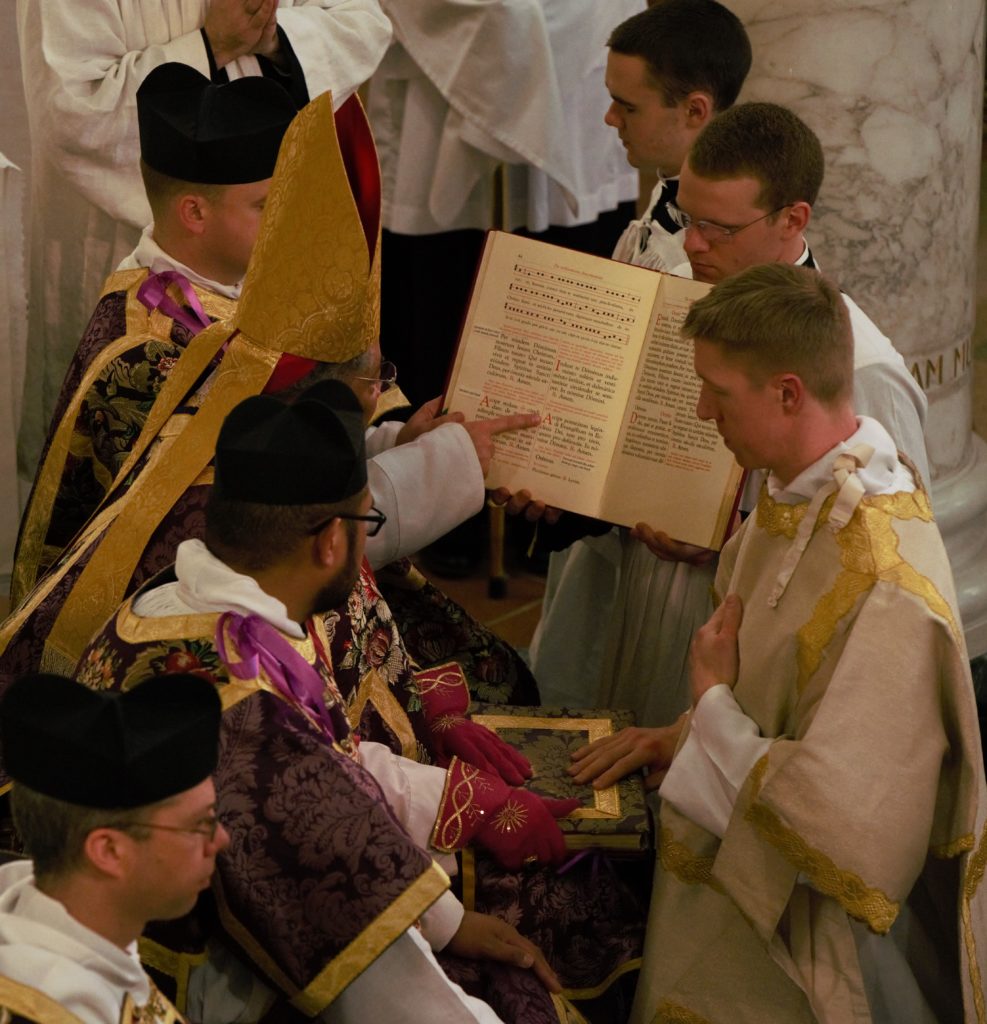St. Thomas and Character
by Fr. William Rock, FSSP
St. Thomas Aquinas states that “in a Sacramental Character Christ’s faithful have a share in His Priesthood” (S.T. III, q. 63, a. 5, c). These “Sacramental Characters” give a share in Christ’s Priesthood by deputing their possessors for Christian Divine Worship and enables them to do so, St. Thomas explains, by giving those possessors new powers, new abilities, which they did not have before.
Each of these powers is either, as St. Thomas designates, an “active” power or a “passive” power.
 The Character of Orders, as St. Thomas explains, gives an active power. That is, it gives its possessor the power to perform sacramental ceremonies and thus allows participation in them. This is why only Priests and Bishops are able, for example, to absolve sins in the Sacrament of Penance. Their Characters give them the power to perform the ceremony of Penance so that the one confessing can enter into it and receive absolution. If one without the proper Character were to attempt to perform a Sacramental ceremony like Penance, the ceremony would cause no effect and, in fact, would not be Sacramental at all.
The Character of Orders, as St. Thomas explains, gives an active power. That is, it gives its possessor the power to perform sacramental ceremonies and thus allows participation in them. This is why only Priests and Bishops are able, for example, to absolve sins in the Sacrament of Penance. Their Characters give them the power to perform the ceremony of Penance so that the one confessing can enter into it and receive absolution. If one without the proper Character were to attempt to perform a Sacramental ceremony like Penance, the ceremony would cause no effect and, in fact, would not be Sacramental at all.
 The Baptismal Character, according to St. Thomas, is a passive power. It is given so that one may receive, or participate in, the other Sacraments when they are brought about by those who have an active power (excepting Matrimony in which the couple brings about the Sacrament, and Baptism in which the one conferring the Sacrament can validly do so without any Character whatsoever).
The Baptismal Character, according to St. Thomas, is a passive power. It is given so that one may receive, or participate in, the other Sacraments when they are brought about by those who have an active power (excepting Matrimony in which the couple brings about the Sacrament, and Baptism in which the one conferring the Sacrament can validly do so without any Character whatsoever).
This is why Baptism is called the “Door of the Sacraments.” Without the Baptismal Character, one does not have the power, the ability, to receive the other Sacraments (including Matrimony). The Baptismal Character is also necessary to fully participate in the Eucharistic Sacrifice of the Mass.
The Sacrifice of the Mass is a sacramental action brought about by one with an active Sacramental power (a Bishop or a Priest), and, as it is sacramental, the participants must have the Baptismal Character to fully participate in it.
But St. Thomas seems to indicate that the influence of these two Characters, Baptism and Orders, goes beyond just the celebration of the Sacraments.
The quote given at the beginning can be expanded to read:
“in a Sacramental Character Christ’s faithful have a share in His Priesthood; in the sense that as Christ has the full power of a spiritual priesthood, so His faithful are likened to Him by sharing a certain spiritual power with regard to the Sacraments and to things pertaining to the Divine worship.” (S.T. III, q. 63, a. 5, c).
Note that here St. Thomas claims that the Faithful received spiritual powers not just in regard to the Sacraments but also in regard “to things pertaining to the Divine worship,” such as the readings at Mass.
This understanding of what the Characters confer is expressed in the Church’s Liturgy, in particular the traditional Ordination Rites. While the Ordination Rites have, like the other Sacraments, a specific part of the ceremony which brings about the intended sacramental effects, this core ceremony is surrounded by other liturgical acts so that the totality of what has been conferred is expressed.
This is why, for example, after the Imposition of the Bishop’s hand in the Diaconal Ordination, each newly ordained Deacon is presented with a Book of the Gospels. As the new Deacon touches the Book, the Bishop says: “Receive the power of reading the Gospel in the Church of God, both for the living and for the dead. In the Name of the Lord.”

Notice how the Bishop specifically uses the term “power” — not “right” or “duty,” but “power” — the same term St. Thomas uses when discussing what is bestowed with the Sacramental Characters.
As was said at the beginning, Sacramental Characters not only enable their possessors to participate in Christian Divine Worship by conferring certain powers, but they also depute them to do so.
There is an inherent correspondence between what powers are given to a person, and what that person is deputed to do. One with an active power is deputed to perform the sacramental ceremonies, while one with a passive power is deputed to receive these ceremonies.
As this is true for the sacramental ceremonies, it seems it would also be true for the other non-sacramental aspects of Divine Worship, as both depend on Sacramental Characters.
It can be argued, therefore, that just as those who have the active Character are divinely deputed to perform the Sacramental ceremonies, they are also deputed to perform the non-sacramental ceremonies (such as the Readings at Mass), while those with the passive Character are divinely deputed to participate in them, but not perform them.
This being the case, any discussion concerning what roles those with only the Baptismal Character are to have at Mass and the other ceremonies which constitute Christian Divine Worship must include a proper understanding of how their Character deputes them in each regard.
Fr. William Rock, FSSP was ordained in the fall of 2019 and is currently in residence at Regina Caeli parish in Houston, TX.
March 8, 2021








